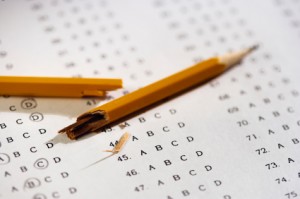Extreme testing anxiety affects about 16 to 20 percent of students. Some anxiety before a test is normal, but an overload of stress starts to impede brain function—like decision-making, which is critical to testing well. But there are a few structural changes that educators can do to help alleviate students’ stress and, in turn, increase their ability to test well.
 Credit: Executive Functioning Success
Credit: Executive Functioning Success Create a Zen classroom through meditation. A variety of reports tout the benefits of meditation for enhancing the ability to concentrate; bringing meditation to schools may have a similar positive impact, helping students perform and cope with stress better. Reducing their stress may also help students feel more comfortable at school and improve their academic performance. Schools in Richmond, Calif., and in the San Francisco Unified School District that have meditation programs in classrooms report that students feel safer and that the regular meditation practice has decreased overall disruptive behaviors—which translates into more teaching time and better engaged students.
Make psychologists in schools a priority. Sometimes, there isn’t a quick fix. A stressful testing environment can exacerbate severe anxiety disorders in children that teachers are not able to address. In those cases, meditation done improperly could make students with mental health issues dwell on something that is anxiety-provoking. That’s why it’s important for schools to have school psychologists on hand. A focus on mental well-being has positive effects on overall school performance and test scores. Beyond easing stress or providing resources for extra care or help, school psychologists can also help identify any outside stressors, such as grief, homelessness, or drug use, which may be impeding performance.
Claire Bocage is a research assistant focusing on workplace psychology. Reach her via email.

 RSS Feed
RSS Feed